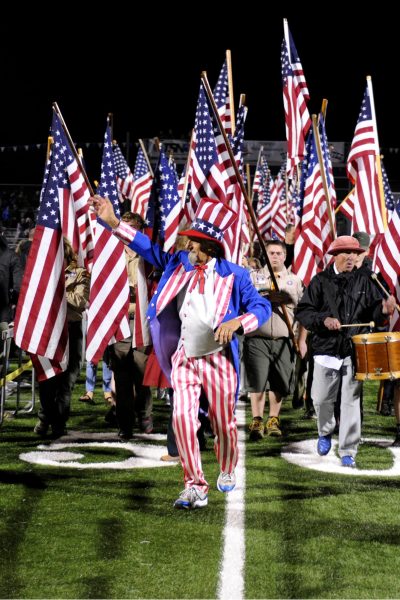Ideological Discrimination
In light of recent events here at Analy and beyond, we have reached a point where our flaws must be acknowledged. It is difficult to believe that such injustice has been allowed to continue unabated for so long. As high schoolers, many have already forgotten the mantra of childhood: “Treat others how you want to be treated.” This school is a place where everyone should feel safe, and the students and teachers here should treat each other with respect, kindness, and decency. Discussing the issues we face is hard, and often times people do not even recognize their contribution to them. That is why we need to have the conversation; we cannot pretend that these issues don’t exist, for doing so would be a disservice to our entire community. To acknowledge our flaws is not to condemn our community as a whole, but we cannot allow such harm to continue to plague our school. Justice and fairness must be ensured to all students, no matter the situation.
We live in a primarily Caucasian part of the world, and the population of Analy mirrors and amplifies this. With a staff demographic that is 99% white and a demographic of students that is almost 80% white, it is clear that not every person on campus has experienced the feeling of being a minority. Since Analy is a microcosm of our society, it is not surprising to learn that there is prejudice among us. The human brain is wired to be biased, and there is no way to fully overcome this. However, it is possible to combat this programmed prejudice through awareness and education. By learning about the many facets of human culture and understanding the perspectives of others, our biases will be weakened by the strength of knowledge. Each and every one of us could serve to recognize the importance of education and of learning about those that we do not understand or relate to in the hopes that we can in the future. By understanding others, we can deepen our understanding of ourselves and prevent further injustices from occurring.
We’ve all heard it––the stereotypes, the generalizations, the condemnation of a name. Perhaps around campus you’ve seen people throw coins on the ground, or mime praying. These actions are rooted purely in ignorance. Without any background or information on a sect of society, people today are deciding that they are justified in cramming an entire diverse group of people into the mold of a stereotype. This is done more often than most of us realize, without so much as a second thought. It is much easier to assume that people will know we are joking instead of having to deeply consider everything we say. In many cases, people try to minimize the issue by pretending it simply does not exist. To act as if the issue is not present in our own lives is to say that we do not need to take any action or fix the problem. Unfortunately, however, here at Analy there have been accounts of an ideology (someone’s own or otherwise) being degraded:
- Some students have openly stated that, in their minds, one of the foundational sects of Islam is “Jihadists/suicide bombers.”
- Those believing in no higher power condemn those that do, stating that “anyone who believes in a God is merely trying to blame someone else for what they are responsible for ruining in their life.”
- When the news hit of multiple Asian planes going missing and/or crashing, one student commented that it was merely Muslims looking for attention.
- During the recent Paris attacks, on numerous occasions could the generalizing argument be heard that stated “all Muslims are ISIS, and therefore dangerous.”
- One can often hear the phrase “dirty Jew” being cavalierly thrown about as an insult.
- Many people will pigeonhole the religion of Christianity, and try to boil it down to an “uptight and elitist” crowd.
- Many students have been known to throw coins on the ground and anyone who picks the money up is called a Jew, actual Jewish students receiving even harsher attacks.
- The term “Amish” has been used synonymously with “boring” by students to insult their peers.
- When a homecoming dance was held on Yom Kippur, one of the most important Jewish holidays of the year, the solution was to require one Jewish student to notify the school of Jewish holidays.
- Even backhanded exclusion appears on social media, on posts questioning why “Muslim pride” or “Jewish pride” are acceptable, yet “white pride” is not, or shared videos of Islamic extremists that serve to perpetuate stereotypes of Muslims.
By drawing attention to these detrimental actions, it does not serve to villainize those who have said these things or believed these ideas. It is to point out the bigger issue, the overarching idea that will alter the course of the future as we all move forward and grow. Religion is not one set of ideals, it’s a huge spectrum. Every region of the world has its own spectrum of beliefs that vary in ideas and intensity, and each point on the spectrum is drastically different from the next. To characterize the entire spectrum based on one point (or on a point that does not even exist) is ignorant and narrow-minded. Religion is personal: it’s about how each of us deals with the miracle of human consciousness, how we see the world and act within it. As no two people see the world the exact same way, there is no one ideology that is best for all people. We can believe that our ideology is best for us, but for the person sitting next to us, it may not be the best. Our job, religious or not, simply as human beings interacting with each other, is to respect everyone’s own ideas. If we are of one faith, or of no faith at all, it does not by any means imply that someone else’s interpretation of this world is incorrect. They have lived differently, grown differently, experienced different things that we have not. As such, who they do or do not choose to turn to is up to them, and our only job as fellow human beings is to honor their choice.
No matter where we come from, what we look like, what language we speak, or what we believe, we are all human beings––drastically different, yet remarkably similar. The issues that currently face Analy are a lot bigger than any one of us, or any club, clique, or group. We are all part of Analy, and together we can enact positive change to our community through awareness, education, and understanding.





